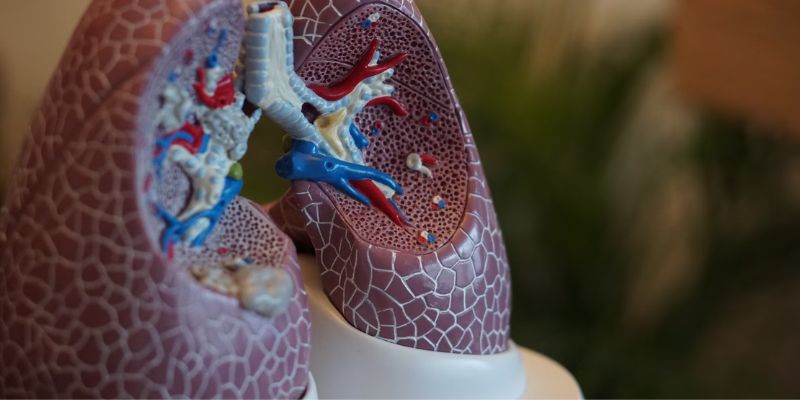Got Bronchitis? How to Spot the Symptoms and Heal Naturally
Mar 01, 2024 By Madison Evans
You wake up one morning with a nagging cough that won't disappear. The day worsens until your chest feels tight, and every breath is a wheezy struggle. Uh oh, could it be bronchitis? Dryness, chesty cough, and difficulty breathing are common signs, but how do you know? And if it is bronchitis, what natural remedies can help you start hacking up that gunk so you can breathe easily again? This handy guide breaks down the telltale symptoms so you can self-diagnose, then gives you doctor-approved home treatments to kick that bronchitis to the curb. Read on to learn how to spot an impending case of bronchitis and heal yourself with items from your kitchen to get back to breathing - and living - in comfort.
What Is Bronchitis?
Bronchitis is inflammation of the bronchial tubes, the air passages that carry air to your lungs. It can be acute or chronic. Acute bronchitis causes a cough that produces mucus, chest discomfort, and wheezing. A viral infection usually causes it and lasts a few weeks. It can be acute or chronic.
Acute Bronchitis: Often caused by viral infections, acute bronchitis typically develops after a cold or flu. It leads to symptoms such as coughing, chest discomfort, fatigue, and sometimes fever. Most acute bronchitis cases resolve independently within a few weeks with rest and home remedies.
Chronic Bronchitis: Chronic bronchitis is a long-term condition characterized by a persistent cough that produces mucus for at least three months in two consecutive years. It is usually caused by cigarette smoking or exposure to other irritants such as air pollution or dust. Chronic bronchitis is a type of chronic obstructive pulmonary disease (COPD) and requires ongoing management to control symptoms and prevent complications.
Causes and Risk Factors
The most common cause of acute bronchitis is a viral infection, usually the same viruses that cause the common cold or the flu. Sometimes bacteria are also involved as a secondary infection. See your doctor immediately if you have a high fever, chills, or severe shortness of breath. Early diagnosis and treatment of bronchitis is essential to avoid complications and get relief from your symptoms. Chronic bronchitis is caused by long-term exposure to lung irritants, especially cigarette smoke. Other risk factors for bronchitis include:
- Smoking or exposure to secondhand smoke
- Asthma or allergies
- Weakened immunity
- Exposure to lung irritants like pollution, dust, or fumes
- Frequent respiratory infections
Common Signs and Symptoms of Bronchitis
If you've got bronchitis, you're probably feeling lousy. Some of the most common symptoms to watch out for include:
A Cough That Lasts: The telltale sign of bronchitis is a cough that sticks around for over a few weeks. At first, you may have a dry cough, but then it produces mucus or phlegm. The cough may be mild at first but then worsens over time. Coughing can be harsh and frequent, disrupting your sleep and daily activities.
Wheezing and Chest Tightness: As your bronchial tubes swell and fill with mucus, breathing can become difficult. You may experience wheezing, chest tightness, and shortness of breath. Taking a deep breath or doing any physical activity may trigger coughing spells or discomfort.
Fatigue and Body Aches: Bronchitis can make you feel run down and tired. You may have muscle aches, chills, and a low fever. The lack of oxygen from wheezing and coughing can contribute to feelings of fatigue and malaise. Getting extra rest is essential while your body fights the infection.
Loss of Appetite: Eating and drinking may be the last thing on your mind when you have bronchitis. The coughing, congestion, and general yucky feeling can reduce your appetite. However, staying hydrated is essential by drinking plenty of warm liquids like herbal tea, broth, and water. Try to eat soft, bland foods that are easy to digest until your symptoms improve.
Natural Remedies and Lifestyle Tips for Bronchitis Relief
Herbal Teas: Drinking herbal teas can help loosen congestion and soothe a sore throat. Licorice root tea acts as an expectorant, helping to thin out mucus secretions. Peppermint or chamomile tea can reduce inflammation and ease coughing. Ginger tea is warming and helps boost your immunity. Steep one tablespoon of herbs in hot water for 10 to 15 minutes and drink 2 to 3 cups daily.
Honey: Raw honey is a natural antibacterial and cough suppressant. Add 1 to 2 tablespoons to warm tea, or take one teaspoon of straight honey every few hours. The honey will coat your throat and relieve irritation.
Steam Inhalation: Inhaling steam works wonders for relieving congestion. Pour some hot water into a dish and add a few drops of essential oils, such as rosemary or eucalyptus. For ten to fifteen minutes, place your face over the bowl, place a towel over your head, and breathe in the fumes. Mucus will be broken up and coughing will be more effective with the steam.
Rest: Get extra rest to allow your body to heal. Lack of sleep can weaken your immunity, making symptoms last longer. Aim for 9 to 10 hours of sleep per night. Also, avoid strenuous exercise and give your lungs time to recover.
Hydrate: Drink fluids like water or warm broth to moisten your bronchial passages and make coughs more productive. Humid air can also relieve coughing and congestion. Use a humidifier to keep humidity levels around 50% in your home.
Conclusion
So there you have it! Bronchitis is no fun, but now you know how to spot it early and take action. A nagging cough plus chest tightness or discomfort are telltale signs. Rest up, hydrate, and consider natural remedies like ginger, thyme, turmeric, or oregano to ease your misery. Don't hesitate to call your doctor if symptoms persist or worsen. The key is listening to your body and taking good care. With the proper self-care, you'll be breathing easy again in no time. Feel better!










